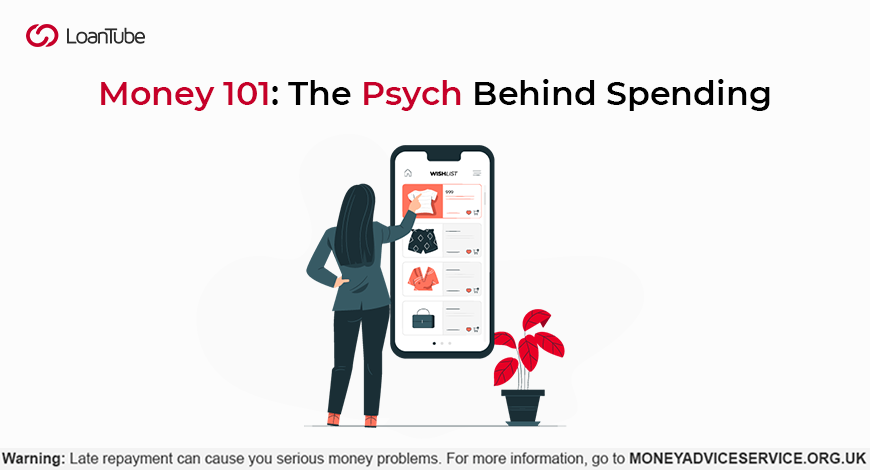We’ve all made impulse purchases. Maybe you bought a summer dress you never wore or a treadmill that became a clothing rack. Irrational shopping decisions happen to everyone.
To improve your spending habits, you must understand your relationship with money. Before diving into that, let’s explore the psychology behind shopping.
This article explains how psychology influences spending. Read on for six strategies to train your brain to spend wisely.
Maximise your options: Compare and apply for loans below with LoanTube
Apply Filters

Loan Amount
£4000 -
£20000
Norwich Trust
Loan Term
1 -
10 years
4.8/5
Representative APR
31.90%
Minimum Age
21 Years
Representative Example: £12,000 over 66 months, 31.9% APR fixed. Monthly payment £358.22 Annual interest rate 28.01% fixed. Interest payable £11,642.52. Total repayable £23,642.52.

4.8/5
Norwich Trust
Loan Amount
£4000 -
£20000
Loan Term
1 -
10 years
Representative APR
31.90%
Minimum Age
21 Years
Minimum Income
£2000 per month
Representative Example: £12,000 over 66 months, 31.9% APR fixed. Monthly payment £358.22 Annual interest rate 28.01% fixed. Interest payable £11,642.52. Total repayable £23,642.52.

Loan Amount
£5000 -
£100000
Evolution Money Loans
Loan Term
1 -
20 years
4.5/5
Representative APR
28.96%
Minimum Age
18 years
Representative Example: Loan Amount: £20950.00, Loan Term: 85 Months, Interest Rate: 23.00% PA Variable. Monthly Repayments: £537.44. Total Amount Repayable: £45,682.15. This example includes a Product Fee of £2,095.00 (10% of the loan amount) and a Lending Fee of £714.00

4.5/5
Evolution Money Loans
Loan Amount
£5000 -
£100000
Loan Term
1 -
20 years
Representative APR
28.96%
Minimum Age
18 years
Minimum Income
Not mentioned
Representative Example: Loan Amount: £20950.00, Loan Term: 85 Months, Interest Rate: 23.00% PA Variable. Monthly Repayments: £537.44. Total Amount Repayable: £45,682.15. This example includes a Product Fee of £2,095.00 (10% of the loan amount) and a Lending Fee of £714.00

Loan Amount
£1000 -
£10000
1Plus1 Guarantor Loans
Loan Term
1 -
5 years
4.4/5
Representative APR
39.90%
Minimum Age
18 years
Representative Example: Borrowing £3000 over 36 months with a representative APR of 39.9% (variable),the amount payable would be £134.21 a month,with a total cost of credit of £1831.56 and a total amount payable of £4831.56.

4.4/5
1Plus1 Guarantor Loans
Loan Amount
£1000 -
£10000
Loan Term
1 -
5 years
Representative APR
39.90%
Minimum Age
18 years
Minimum Income
Not mentioned
Representative Example: Borrowing £3000 over 36 months with a representative APR of 39.9% (variable),the amount payable would be £134.21 a month,with a total cost of credit of £1831.56 and a total amount payable of £4831.56.
What Your Spending Patterns Reveal
- Immediate gratification: Do you buy coffee daily instead of bringing it from home? Have you ever ordered takeout out of laziness? These habits reflect instant gratification. Instead of waiting for long-term rewards, people choose smaller, immediate ones. Those who manage money well have better impulse control and can delay gratification.
- Scarcity principle: The fear of missing out (#FOMO) drives many purchases. The scarcity principle states that limited availability increases desire. If you see a ‘limited time’ or ‘last chance’ deal, you may feel pressured to buy. Marketers create urgency to encourage spending, making you act quickly without thinking.
- Irretrievable expenditures: A sunk cost is money already spent and unrecoverable. Business owners experience this with equipment costs. A common example is a gym membership. You may feel motivated in January and pay for six months. After a few weeks, you realize you prefer home workouts. Since the money is already spent, renewing would waste more. Instead, invest in something useful.
- Anchoring: People fixate on the first price they see when shopping. Suppose a dress originally costs £150 but is on sale for £75. The £150 price (the anchor) makes £75 seem like a bargain. The store may have inflated the original price, or you may not need the dress. Anchoring can lead to unnecessary spending.
- Social facilitation: People influence each other’s choices. Sometimes, this is positive, like increased productivity in a competitive office. But in spending, it often works against you. Take auctions, for example. The excitement of bidding can cloud judgment, making you spend more than planned. Next time, pause and think before making a purchase.
6 Psychological Tricks to Curb Overspending
Instead of forcing yourself to stop spending, focus on making smarter choices. Here are six simple tricks to help.
- Use new notes: It’s harder to part with crisp new bills. You may prefer not to spend them unless necessary.
- Wear heels when shopping: Balancing in heels requires focus, reducing impulsive decisions.
- Pause and reflect: Ask yourself, “Why am I here?” “Do I need this?” “How will I pay?” “Will I regret this?”
- Visit fewer stores: Shop at places that already have what you need. This prevents unnecessary browsing.
- Avoid being too friendly with sales staff: Over-friendliness can create a sense of obligation to buy.
- Don’t carry a credit card: Relying on credit encourages overspending. Since payments aren’t immediate, it’s easier to justify purchases.
Conclusion
Changing habits takes time. The first step is understanding your relationship with money and recognizing your financial triggers. Once you do, better choices will follow.


